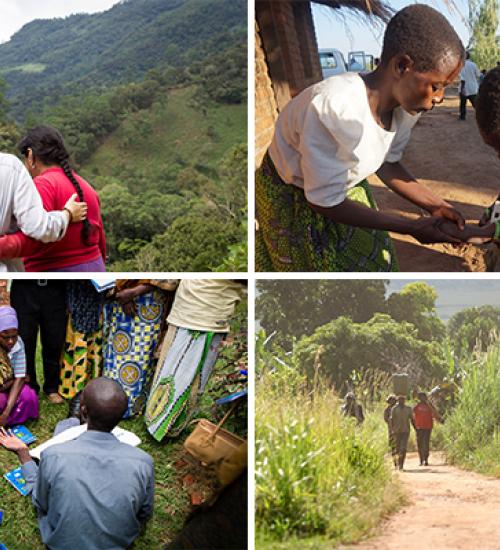
The concept of accompaniment, long championed by theologians such as Kellogg Institute Faculty Fellow Rev. Gustavo Gutiérrez, OP, is gaining traction both in scholarly discourse and in organizational practices of international aid delivery. International development organizations such as Partners In Health, Lutheran World Relief, and Catholic Relief Services employ accompaniment as a core principle of their work. Emphasizing mutuality, capacity building, participation, and agency, many approaches promote multisectoral partnerships and investment in local and national institutions in pursuit of sustainable development.
Since 2011, the Kellogg Institute for International Studies has spearheaded a multidisciplinary initiative that links research and practice to explore accompaniment as a paradigm for sustainable human development. The effort builds upon the Institute’s longstanding relationship with the global health organization Partners In Health, the 2011 recipient of the Notre Dame Award for International Human Development and Solidarity.
Workshops and Gatherings
2016: The Kellogg Institute hosted the public workshop Accompaniment in Practice, which brought together development practitioners and scholars to investigate practical models of accompaniment and implications for research and policy. The workshop built upon a series of discussions hosted by the Institute.
2013: Convening practitioners and scholars, an interdisciplinary workshop helped generate a framework for ongoing policy-relevant research on accompaniment. Representatives from global health, education, law, and various social sciences engaged practical examples of accompaniment to consider its realization at the individual, societal, and policy levels.
2011: The Institute hosted “Re-imagining Accompaniment: Global Health and Liberation Theology,” a public dialogue between Paul Farmer, co-founder of Partners In Health, and his long-time hero, Gustavo Gutiérrez.
Resultant Publications
Emerging from the 2013 and 2016 workshops, a new coedited volume maps out a theory of accompaniment and illustrates its implementation across fields. Edited by Kellogg Institute Executive Director Steve Reifenberg and Chief Adviser to Dr. Farmer Jennie Weiss Block, OP, the book is authored by Farmer and other development practitioners. It is forthcoming with PublicAffairs.
Drawing on the writings of Farmer and Gutiérrez and including the 2011 dialogue between them, In the Company of the Poor: Conversations with Dr. Paul Farmer and Fr. Gustavo Gutiérrez (Orbis, 2013), charts both figures’ commitment to the poor and the role of accompaniment within their life and work.
Student Engagement
Since 2014, the Kellogg Institute has collaborated with Partners In Health affiliate Compañeros En Salud (CES) to facilitate the opportunity for a graduating senior of the University of Notre Dame to work as a Community Health Programs Assistant for one-year with CES in Chiapas, Mexico. Graduates have worked with the Acompañante program, which seeks to improve outcomes among people living with chronic disease by training community members to “accompany” patients in their ongoing care.
Photo Credits (clockwise from upper left):
Dr. Andrea Jimenez Peña visits the home of a patient outside the rural community of Matasano in Chiapas, Mexico. (Photo by Aaron Levenson/Compañeros en Salud, 12/8/15)
Village Health Workers Sevelia Zuze and Enifa Gluno screen a child for malnutrition during a community health event in Nvala, Malawi. (Photo by Lila Kerr/Partners In Health, 7/1/15)
The road to Nnindye, Uganda, where the Kellogg Institute’s Ford Program has partnered with Nnindye residents in community development efforts. (Matt Cashore/University of Notre Dame, 2010)
Community Health Workers in Kirehe, Rwanda are trained in accompaniment for patients with HIV. (Photo by Cecille Joan Avila/Partners In Health, 2/18/15)





